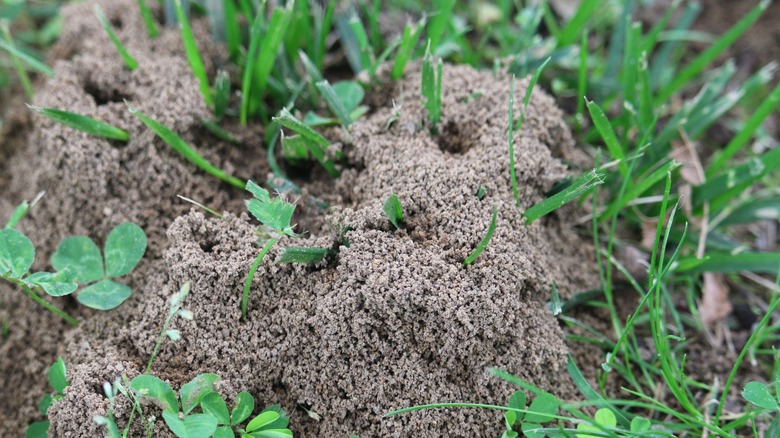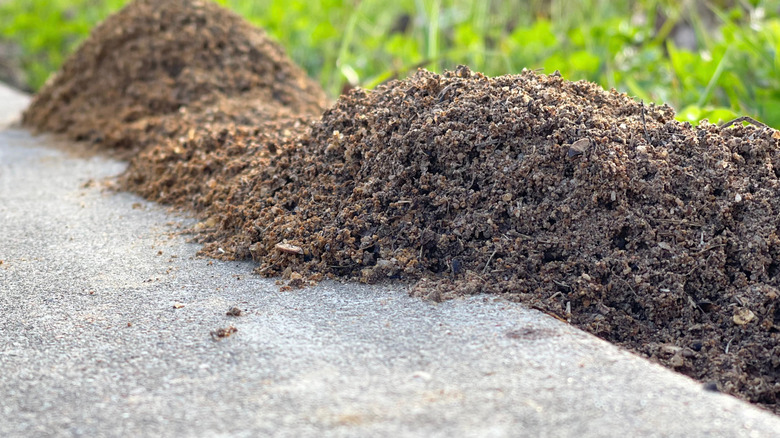Is Urine The Secret Weapon Against Persistent Ant Hills In Your Yard?
There are tons of old wives' tales we tend to believe, even though there's little to no evidence to back them up. The five-second rule isn't real because germs can transfer almost instantly, and swallowing gum won't result in it being stuck in your stomach for seven years. But one of the more surprising claims going viral on social media is that urine can eliminate stubborn ant hills in your yard. Though there might be some evidence to back that claim up, the answer is a little more complicated than a simple yes or no.
Instagram user @backyardgardengirl, who supports this claim, explains that collecting urine in a mason jar and sealing it for a few days allows it to ferment. This, in turn, allows time for ammonia to build up, a gas known for its strong, suffocating odor, especially at higher concentrations. Then pour the fermented urine over an ant hill, and it is believed to eliminate the mound (and kill some ants in the process) due to the effects of the ammonia. The day after applying the urine, you can rinse the area with water to help remove any lingering odor.
Now, this isn't something recommended for daily use, but rather used as a sporadic extermination method you'd apply throughout the year to keep the ants under control. This method is a natural and chemical-free alternative to store-bought ant killers, and best of all, it doesn't cost anything to give it a try. But is there any evidence that proves it actually works?
Why human urine might be an effective ant exterminator
As odd as it may sound, human urine could be an easy and effective method for getting rid of ant hills, but only when it's fermented and has high ammonium content. That's because ammonium is an effective ant killer and can even disrupt the pheromone trails ants leave behind that guide the rest of their colony to food and resources. While urine doesn't naturally contain ammonia, storing it allows the urea to break down into ammonia through a process called urea hydrolysis.
According to a 2017 study published in the Journal of Environmental Management, untreated urine stored for 36 days saw its ammonium levels increase by 32%. When fermented properly and poured over an ant hill, especially one containing the queen, it may help break down the mound, disrupt the colony, and even kill off some ants. How well it works depends entirely on how strong the ammonium concentration is.
Deciding how long you should let the urine sit and ferment is a little ambiguous. The scientific study says ammonia levels rose by 32% after 36 days. @backyardgardengirl didn't specify their time frame, but "let it sit for days," and was successful in keeping their lawn ant-free. So perhaps a trial-and-error approach might work best here.
Evidence that suggests urine won't get rid of ant hills
Urine containing high amounts of ammonia might break down an ant hill and hopefully put an end to ants in one easy hack. However, there's a chance human urine just isn't an effective ant exterminator. And that's because ants are generally attracted to urine, especially if it comes from someone with Type 1 diabetes, whose urine typically contains larger amounts of glucose.
Because human urine contains urea, a compound formed when the kidneys break down proteins, ants are naturally drawn to it. A study conducted by wildlife ecologist Dr. S. Topa Petit and published in Austral Ecology tested several baits, including urea, human urine, sugar water, and even kangaroo urine. The researchers discovered ants were most attracted to the urea, and preferred human urine over kangaroo.
Ultimately, when considering this DIY pest control method, it seems to all come down to the fermenting process, which breaks the urea down into ammonia. If urine is fermented for a long enough period, it undergoes chemical changes that might be enough to break down the ant hill and keep the ants away. But if urea is still present in the mix, there's a good chance the liquid might just soften the mound and attract even more ants in the process.

